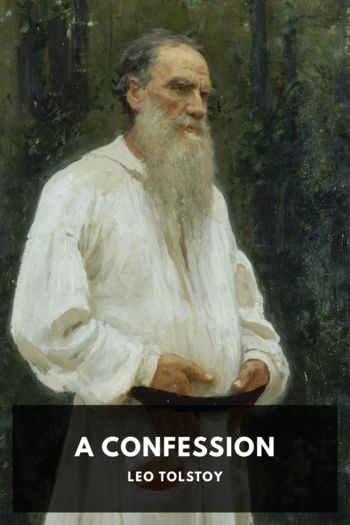A Confession by Leo Tolstoy (all ebook reader .txt) 📕

- Author: Leo Tolstoy
Book online «A Confession by Leo Tolstoy (all ebook reader .txt) 📕». Author Leo Tolstoy
“Art, poetry?” … Under the influence of success and the praise of men, I had long assured myself that this was a thing one could do though death was drawing near—death which destroys all things, including my work and its remembrance; but soon I saw that that too was a fraud. It was plain to me that art is an adornment of life, an allurement to life. But life had lost its attraction for me, so how could I attract others? As long as I was not living my own life but was borne on the waves of some other life—as long as I believed that life had a meaning, though one I could not express—the reflection of life in poetry and art of all kinds afforded me pleasure: it was pleasant to look at life in the mirror of art. But when I began to seek the meaning of life and felt the necessity of living my own life, that mirror became for me unnecessary, superfluous, ridiculous, or painful. I could no longer soothe myself with what I now saw in the mirror, namely, that my position was stupid and desperate. It was all very well to enjoy the sight when in the depth of my soul I believed that my life had a meaning. Then the play of lights—comic, tragic, touching, beautiful, and terrible—in life amused me. No sweetness of honey could be sweet to me when I saw the dragon and saw the mice gnawing away my support.
Nor was that all. Had I simply understood that life had no meaning I could have borne it quietly, knowing that that was my lot. But I could not satisfy myself with that. Had I been like a man living in a wood from which he knows there is no exit, I could have lived; but I was like one lost in a wood who, horrified at having lost his way, rushes about wishing to find the road. He knows that each step he takes confuses him more and more, but still he cannot help rushing about.
It was indeed terrible. And to rid myself of the terror I wished to kill myself. I experienced terror at what awaited me—knew that that terror was even worse than the position I was in, but still I could not patiently await the end. However convincing the argument might be that in any case some vessel in my heart would give way, or something would burst and all would be over, I could not patiently await that end. The horror of darkness was too great, and I wished to free myself from it as quickly as possible by noose or bullet. That was the feeling which drew me most strongly towards suicide.
V“But perhaps I have overlooked something, or misunderstood something?” said I to myself several times. “It cannot be that this condition of despair is natural to man!” And I sought for an explanation of these problems in all the branches of knowledge acquired by men. I sought painfully and long, not from idle curiosity or listlessly, but painfully and persistently day and night—sought as a perishing man seeks for safety—and I found nothing.
I sought in all the sciences, but, far from finding what I wanted, became convinced that all who like myself had sought in knowledge for the meaning of life had found nothing. And not only had they found nothing, but they had plainly acknowledged that the very thing which made me despair—namely the senselessness of life—is the one indubitable thing man can know.
I sought everywhere; and thanks to a life spent in learning, and thanks also to my relations with the scholarly world, I had access to scientists and scholars in all branches of knowledge, and they readily showed me all their knowledge, not only in books but also in conversation, so that I had at my disposal all that science has to say on this question of life.
I was long unable to believe that it gives no other reply to life’s questions than that which it actually does give. It long seemed to me, when I saw the important and serious air with which science announces its conclusions which have nothing in common with the real questions of human life, that there was something I had not understood. I long was timid before science, and it seemed to me that the lack of conformity between the answers and my questions arose not by the fault of science but from my ignorance, but the matter was for me not a game or an amusement but one of life and death, and I was involuntarily brought to the conviction that my questions were the only legitimate ones, forming the basis of all knowledge, and that I with my questions was not to blame, but science if it pretends to reply to those questions.
My question—that which at the age of fifty brought me to the verge of suicide—was the simplest of questions, lying in the soul of every man from the foolish child to the wisest elder: it was a question without an answer to which one cannot live, as I had found by experience. It was: “What will come of what I am doing today or shall do tomorrow? What will come of my whole life?”
Differently expressed, the question is: “Why should I live, why wish for anything, or do anything?” It can also be expressed thus: “Is there any meaning in my life that the inevitable death awaiting me does





Comments (0)